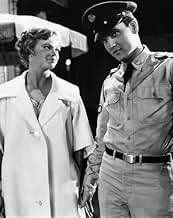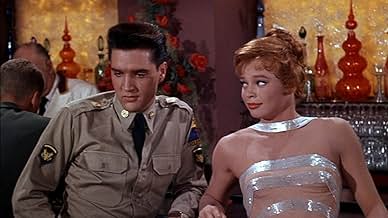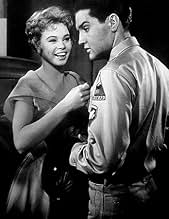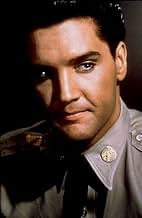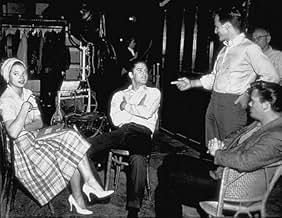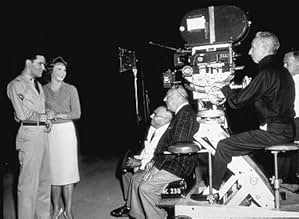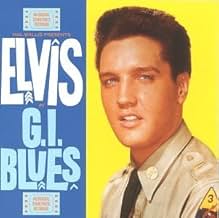Ajouter une intrigue dans votre langueTulsa McLean, a soldier with dreams of running his own nightclub, places a bet with his friend Dynamite that he can win the heart of an untouchable dancer. But when Dynamite is transferred, ... Tout lireTulsa McLean, a soldier with dreams of running his own nightclub, places a bet with his friend Dynamite that he can win the heart of an untouchable dancer. But when Dynamite is transferred, Tulsa must replace him in the bet.Tulsa McLean, a soldier with dreams of running his own nightclub, places a bet with his friend Dynamite that he can win the heart of an untouchable dancer. But when Dynamite is transferred, Tulsa must replace him in the bet.
- Réalisation
- Scénario
- Casting principal
- Récompenses
- 3 nominations au total
- Tina
- (as Leticia Roman)
- Mac
- (as Ken Becker)
- Owner of Puppet Show
- (as Ludwig Stossel)
Avis à la une
The reason to watch G.I. Blues is not the story, the cinematography nor the direction even though all three are done with precision and no overkill. The reason to watch is Elvis. This movie was made in 1960 when The King was at his prime and starting to feel comfortable on screen. His performances are excellent, musical numbers that is, and we're all lucky to have them captured. The movie and Elvis are full of charm and you wonder at times how much Elvis' real life was mirrored with all that charm-like atmosphere around him. ***/**** (for an Elvis flick).
On a side note if you find an original poster of this movie, call me.
Still, the version of Elvis that "GI Blues" presented went a step further than just maturity. If it'd been a one-off deal there'd have been no problem -- the problem was that they kept trying to remake the film, as Elvis himself complained. And the problem with THAT, when you come down to it, is that the man was capable of much, much more. Certainly, he was able to act more effectively than we'd see in later properties like "Clambake" and "Double Trouble." The two films that followed this one, the great "Flaming Star" and "Wild In The Country," ably proved that. Then along came the box-office smash "Blue Hawaii," giving Elvis his biggest film receipts since "GI Blues" and cementing to a great extent his Hollywood future. As if the loss of a potentially great and certainly charismatic acting talent weren't enough, the focus on the bottom line led inexorably to weaker and weaker soundtracks. It didn't take long before Elvis was, with a few exceptions, turning out substandard recordings that would eclipse in volume and sales the still-great studio work that he too seldom did during the '60s. As catchy as I find some of these movie songs, and despite the redeeming qualities to be found in many, the sad fact is that most of what he recorded for the movies was far, far below what he was capable of even on a bad day. Take the movies, but leave the man his music. That is the real tragedy of Elvis' movie career, I think, and the reason why we should cringe at the thought of "GI Blues," the movie that started it all.
But I can't do that. I really can't hate such a good-natured film. Even this early in his '60s formula-movie days the music is watered-down to a great extent but most of the songs are still of high quality and some are exceedingly catchy or well done (e.g., the title song, the beautiful "Doin' The Best I Can," "Shoppin' Around," and even the sometimes-maligned "Wooden Heart"). The soundtrack sold like hotcakes -- over two years on the US charts! -- and the movie did huge business. Yes, indeed, Elvis was back! It's not the movie's fault that it became a turning point and one with, ultimately, dire consequences. Elvis' performances is, as befits the material, not as gritty or edgy as that of his previous role (in 1958's classic "King Creole") and this is more a straight musical-comedy of the kind that'd sustained Hollywood for decades. There are a few twists, though, such as the acceptance of one of Elvis' bandmates having fathered a child out of wedlock, and Elvis gets to show off his comic skills to great advantage in several scenes, including those that center upon that baby, 'Tiger.' Actually, it's the scenes with 'Tiger' that I always remembered above all else from when I first saw this movie back in the '70s. I like some of the things that indicate a self-awareness in the movie: Elvis' line at the movie's end, delivered to the camera, is most obvious, but the whole "Blue Suede Shoes" jukebox scenario's pretty funny and Elvis makes two references to "All Shook Up" during the narrative. Elvis does get to flash a couple of looks of anger and even arrogant confidence across his face a couple of times -- he was utterly convincing, just with a look, at portraying such emotions -- but for the most part he's a fairly happy-go-lucky sort in this film. He radiates charm throughout, echoing the sentiments of his "Love Me Tender" costar, Richard Egan: "That boy can charm the birds right out of the trees." Elvis' male and female co-stars all do a competent job throughout, and someone evidently thought enough of Juliet Prowse's long-legged dancing routines to include two of them in the film.
The producers shot scenes while Elvis was still in Germany but used a double for his long-shots. All of the German scenes that we see are either projected behind the principals or are scenes shot on location with other people, while Elvis was still over there finishing his tour of duty. They obviously put a lot of thought into storyboarding the film and getting costumes and everything else sorted out so that location shots would match soundstage scenes. This was not a quick and nasty 'quickie' film -- that would come later, beginning with the filming of "Kissin' Cousins" in 1963.
"GI Blues": it's a nice, entertaining movie, so it does its job. No heavy themes or messages, just the kind of thing that lets you spend a little time in the land of escapist, lightweight, boy-meets-girl stories. It has its place. It's just a pity that its place turned out to be right at the pivot point in the career of the most exceptional vocal and stage performer of the century.
Taurog like so many in Hollywood in front of and behind the camera was getting less and less employment and taking what he could get. These were the kind of people that Elvis's manager Colonel Tom Parker made sure helped his meal ticket in any way possible. Norman Taurog won an Oscar in 1931 for Skippy and was nominated for his direction of Boys Town in 1938 which won Spencer Tracy an Oscar. Over the years Taurog directed such musical performers as Bing Crosby, Dean Martin, Mario Lanza, Eddie Fisher, and Debbie Reynolds. This man was most assuredly a help to the King's career and I've no doubt Parker was behind getting him.
Parker is a controversial figure, especially among Elvis's legion of fans as to whether he helped or hindered Elvis's career. He might have done a little of both, but one thing the man was always sure of is that in Presley's movies, he made sure that he got the best support in front and behind the camera. Norman Taurog extended his own career via the King. Everybody made out here.
The Colonel also was a master at keeping the publicity going while Elvis was a $78.00 a month GI serving in Germany. So much so there was a tremendous about of advance publicity about this film which was about a young rock and rolling soldier who finds love in Frankfurt.
Elvis gets hooked into a Guys and Dolls type bet that he can't spend the night in Juliet Prowse's apartment. Prowse is a local entertainer at one of the clubs in Frankfurt and she's got a reputation as one cold lady. But you know she ain't got a chance with the king.
Part of the publicity surrounding this film was Juliet Prowse's relationship with another guy she did a film with that year, Frank Sinatra. She and Sinatra were quite the item and they announced their engagement and then broke it off just as quickly. Juliet was quite the dancer both in GI Blues and in Can-Can. I remember all of this quite well as a lad. And it was always a special treat in Elvis films when he got a female co-star who was also musical like Ann-Margret, Nancy Sinatra, or Juliet Prowse.
Elvis had a bunch of songs in the film including his own Blue Suede Shoes playing on a jukebox during a bar brawl. One song I really liked was Pocketful of Rainbows which he sings to Juliet while riding in a cable car. It should have been a bigger hit for him.
GI Blues was a fine jump start for Elvis's return to the big screen and to his loyal legion of fans.
Le saviez-vous
- AnecdotesDespite the European locale, all of Presley's scenes were filmed in Hollywood.
- GaffesThe G.I.s are wearing underwear in the shower.
- Citations
Tulsa McLean: [while trying to pry a sandwich out of a baby's hand] Army manual, section 43 - when in hand to hand combat with the enemy, apply judo chop to the back of neck. Oh, if you was only my size, you little rascal.
- Crédits fousAfter the opening credits: Produced with the full cooperation of the U.S. Army and the Department of Defense
- Versions alternativesBecause of copyright problems, in the European version of the movie the song "Tonight Is So Right For Love" (by Sid Wayne and Abner Silver) which was based on the melody of "Bacarolle" by Jaques Offenbach, was substituted with "Tonight's All Right For Love" (by Wayne, Silver and Joe Lilley), which had similar lyrics but was based on the melody of "Tales From The Vienna Woods" by Johann Strauss.
- ConnexionsEdited into Elvis (2022)
Meilleurs choix
- How long is G.I. Blues?Alimenté par Alexa
Détails
Box-office
- Budget
- 2 000 000 $US (estimé)
- Durée1 heure 44 minutes
- Rapport de forme
- 1.85 : 1
Contribuer à cette page



